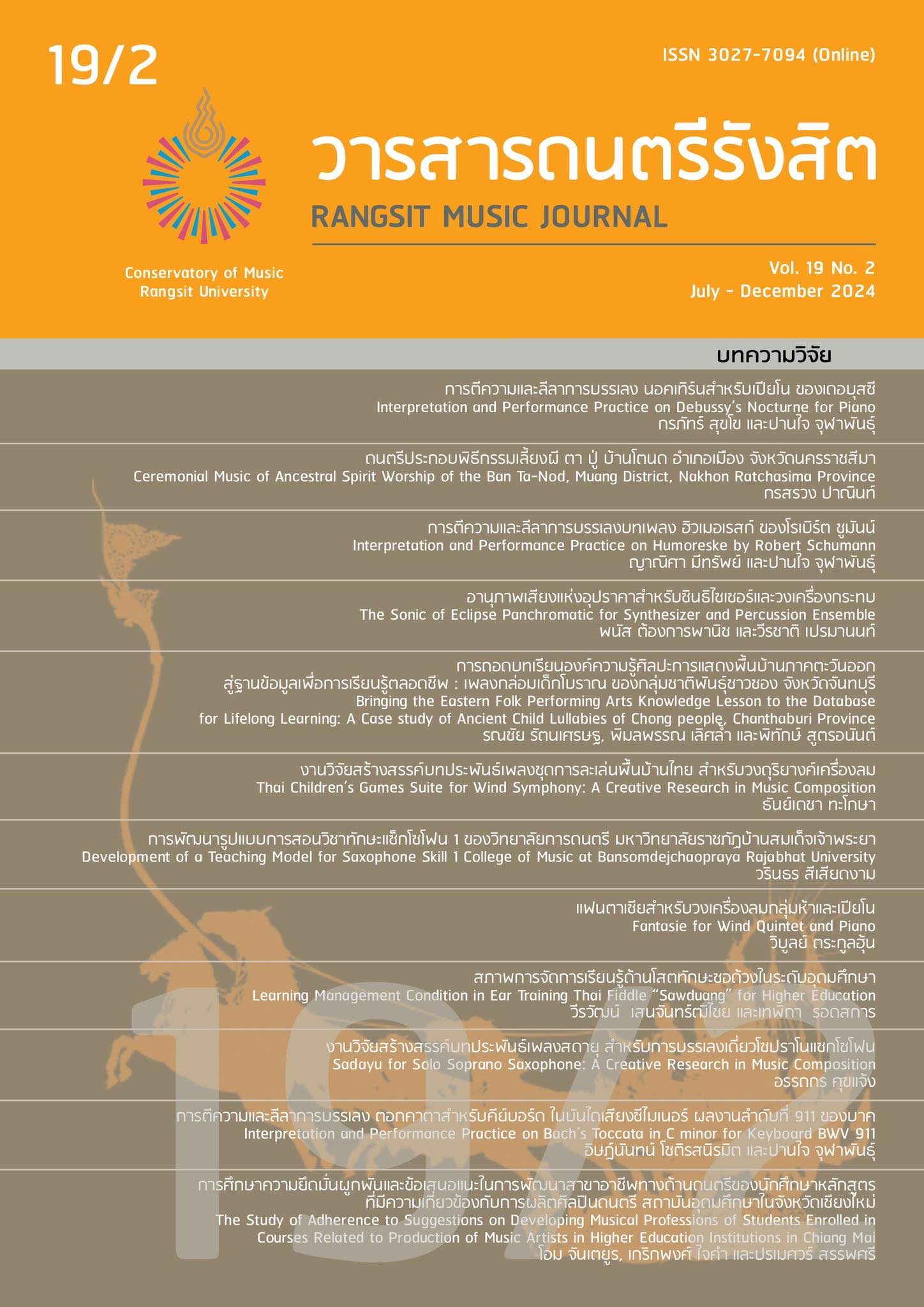Ceremonial Music of Ancestral Spirit Worship of the Ban Ta-Nod, Muang District, Nakhon Ratchasima Province
DOI:
https://doi.org/10.59796/rmj.V19N2.2024.R0202Keywords:
Ceremonial Music, Ancestral Spirit Worship, Nakhon Ratchasima ProvinceAbstract
The research is a qualitative research which aims at studying on ceremony, social reflection and culture along with researching on inheritance guidelines of Pi Ton Korat. It is found that Ban Ta-Nod villagers believes in ancestral spirit so in a year, the worship is held 2 times which are the Ceremony of Pronouncing Ancestor in the period of the waxing moon on the 3rd month and on the 6th month as the Ancestral Spirit Worship Ceremony. The Ceremony has 4 steps which are 1) Ancestral spirit invitation performs “Choenpee Natab Khaotomtidpoong.” 2) Raise a Spirit performs “Kaopee Natab Khaotomtidpoong” 3) Spiritual Dance performs “Kantrum Natab Ramsurng and Kamarelaikuay Natab Ramton” 4) Dispel the Unfortunate: Ton Korat performs without Pi Kaew Natab Khaotomtidpoong”. Pi Ton Korat contains musical instruments including Pi Kaew, Ton Korat, Ching, Chab Lek, and Krab. Such activities create reflections and social culture from cultivating a good conscience towards parents, benefactors, knowing the sins and penalties which leads to the villagers to rule themselves with moral principles and beliefs taught by their ancestors, creating love, unity, and caring for each other. For inheritance of Pi Ton Korat, both musicians and Ton Korat maker have fewer descendants due to many factors such as economic when the progress of culture has changed into the modern era, the values of the living of the local people affecting on the change of culture.
References
Charanyanon, Sirisak. “Belief in the Spirit of Grandfather in Baannongtuen, Khewa Sub-district, Mueang District, Mahasarakham Province.” MA thesis, Mahasarakham University, 1999. (in Thai)
Intrasunanon, Kanjana. Basic Culture Anthropology. Bangkok: Faculty of Fine Arts, Srinakharinwirot University, 1997. (in Thai)
Jekjuntuek, Benjaphon. “Guideline for the Management and Revitalization of Korat Song Performance in Nakhon Ratchasima.” Master’s thesis, Silpakorn University, 2014. (in Thai)
Kaemmer, John E. Music in Human Life: Anthropological Perspectives on Music. Austin, TX: University of Texas Press, 1993.
Nangkasem, Niwat. “Belief in the Spirit of Grandfather in Esaan: Case Study Bankhonburi Khonburitai Sub-district, Khonburi District, Nakhonratchasima Province.” MA thesis, Ramkhamhaeng University, 1984. (in Thai)
Panin, Kornsuang. Pi Ton Korat Band. 2 April 2022. Digital photograph.
Phothikawin, Thanyaporn. “The Inheritance and Existence of Kaewbucha Ensemble in Nakhonchaisri District, Nakhonpathom Province.” Journal of Research and Creative Project, College of Music, Mahidol University, Humanities, Social Sciences and Arts 10, 3 (2017): 530-547. (in Thai)
Roongruang, Panya. Ritual Music on the Occasion of the 75th Anniversary of Thammasat University and the 37th Thai Higher Education Music Festival. Bangkok: Techpromotion and Advertising, 2009. (in Thai)
Suwan, Suraphon. Thai Musical Instruments in Thai Culture. Bangkok: Active Print, 2008. (in Thai)
Yupanao, Chalerm. (Inheritor of the Korat tone). Interview by Kornsuang Panin. January 17, 2021. (in Thai)
Downloads
Published
How to Cite
Issue
Section
License
Copyright (c) 2024 Rangsit Music Journal

This work is licensed under a Creative Commons Attribution-NonCommercial-NoDerivatives 4.0 International License.







